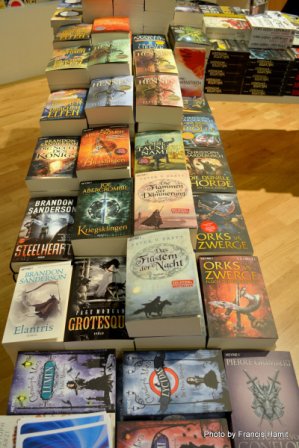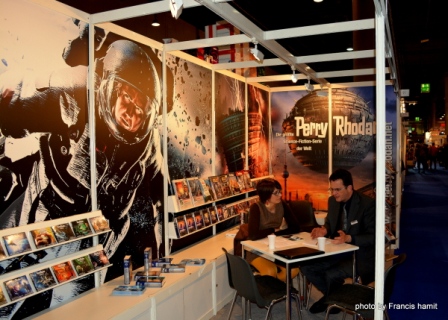By Francis Hamit (Copyright 2014, All Rights Reserved.) The Frankfurt International Book Fair (aka Buchmesse) was the first trade show I covered as a journalist. That was in 1969 when I was living in Frankfurt and stationed at Headquarters, US Army Security Agency, Europe. I was working on the unit newspaper and we had business cards that served as press credentials. I also covered the show in 1970, as well as some rock concerts, theatrical productions, horse and Formula One car races. It was a job that was lifedefining. I’ve covered hundreds of similar events since – but not lately. This was probably my last.
The Book Fair was an enormous event then, and is gigantic now. The Messehalle (convention center) has been expanded several times over the last 40 years. The Book Fair is mostly about selling translation rights to publishers in other languages. My books are normally represented by Loris Essary, of International Titles in Austin, Texas. Loris was there again this year but gravely ill, and had to leave early.
I was there because Leigh Strother-Vien, my long-time roommate, editor, and business partner, and I decided to add ten days in Germany to our very long business trip to the United Kingdom. She had also served there in the US Army at a later time. We offered to cover science fiction books on offer at this year’s show for File 770. Mike Glyer e-mailed for press credentials for us both. I got an-mail back that mine would be waiting and Leigh was refused.
Why? They said she lacked credentials. I suppose, being German, they simply looked up my name in their records and saw that I had been there before. She had not. That’s as good an excuse as any. Leigh was having mobility problems and feeling a bit ill, but came along on the first day. She’s the former Librarian of the LASFS and a topic expert.
The desk where the press credentials were handed out was staffed by some rather robotic females who could not fix the problem. That could only be done in the Press Room, which was in Hall Eight. We were in Hall One. Leigh could buy a day pass for 57 Euros to get that far or forget it. I told her to take a cab back to the hotel while I pressed on.
I noticed that there were several local journalists, all with the look of show veterans, who were also being denied press passes. All were older, which got no consideration from the robots, who coldly informed them that they needed to have registered for those passes online, and could still do so with their smart phones.
“I don’t have a smart phone,” one elderly reporter tearfully confessed; “I’ve never used one.” He had been covering the show for years as a freelancer and probably didn’t make enough to afford new technology. The day pass was also obviously beyond his means, and, even so, paying to work is a violation of journalistic ethics. It makes one a participant, rather than an objective observer. The other journalists, realizing they, too, were being stiffed by the show management with a scheme to make them pay or go home, talked angrily among themselves. I assume they all left. Working on speculation is hard enough when you have a real press room and show management wants you there. It is physically and mentally demanding, almost like being in combat.
For those reasons I gave up covering trade shows more than a decade ago. The concrete floors don’t get any kinder as you get older, and I’m 70 now, with various structural problems that quickly put me in severe pain. Hall Eight turned out to be a couple of kilometers away. There were some moving sidewalks along the way, but I was sweating profusely by the time I got there. I had a slight detour to meet Loris, who’d I never seen in person before, and his wife. We talked briefly. He said the show was changing and not in a good way. Later he e-mailed me a long commentary, part of which I’ll put here.
“The Frankfurt Fair is finished as any sort of significant book event. Did you notice in walking around how many stands had nothing to do with any aspect of the book industry?
“The German publishers certainly did and filed an official protest with the fair director over the inclusion of so many grocers, vintners, travel agencies, and marketing reps for travel destinations.
“While we’ve seen a steady decline in meeting opportunities and aisle traffic for the past few years, those came down on the Germans this year like a pallet of cinder blocks.
“Some of the Germany publishers reported as much as a 90% decline over 2013 in their professional contacts and even a 50% reduction in sales to the public on the weekend because even the German public stayed away in significant numbers.
“When the Germans raised these concerns with the fair director in a private meeting at the end of the fair, they were told that the fair had excelled this year at creating opportunities, that the publishers themselves had poorly organized to take advantage of those opportunities, and that the fair organizers were disappointed in the German publishers for harming the image of the fair due to their half-hearted attempts to conduct business.
“At that point, the Germans stood up, tossed their renewal contracts for next year back to the director and walked out. They won’t be back next year for what’s really their own national fair. With the Germans giving up their stands in addition to everyone around the world dropping out, the fair’s dead.
“European publishers have begun to move away from business models involving the purchase and sale of translation rights. I don’t know if you saw the many incredible statements in the show newspapers about this.
“What they’re doing apparently comes from beginning to model themselves on Random House. Random House is not only the largest English language publisher in the world. Random is now also the largest Spanish language publisher in the world. What they’ve done and are continuing to do is to set up and run their own imprints in languages other than English into which they translate their own English language titles.
“Many European publishers have begun to do the same, including setting up their own English language imprints. In summary of these changes, more than one CEO of European houses said that Europe currently is no longer involved in the buying and selling of rights.
“By comparison, they agreed that Asia is still working on the old models and that’s about the only place rights can be sold for the foreseeable future.
“There’s another factor that touches on both the decline of the fair and the change in rights models: a significant number of German publishers filed for bankruptcy since the 2013 Fair. As a whole, the German book industry is very weak at the moment.”
After 26 years, Loris, who only sell translation rights to English language titles, is giving up on Frankfurt. He said that there will not even be an English language pavilion next year. That does not bode well for authors. It strengthens the bargaining position of traditional publishers who now gain greater control over ancillary markets. They can not only just reserve an author’s work for their foreign affiliates, but refuse to entertain competing bids. They can also decide NOT to publish an author in those markets.
This happened with my book on Virtual Reality in 1993. VR was the year’s hot topic and mine was a best-seller wih great reviews. The VR field was moving so fast that it was also a “flash in the pan”, declared “out-of-print” after 13 months, which killed all of the foreign language editions except the one in Brazil. Those rights went to a publisher who was not owned by the parent company. The check for my half of those rights never arrived, but the amount was so small my Chicago lawyer said it wasn’t worth suing over. This is why I hired Loris to represent me in Frankfurt and London. Loris normally has 300 books on offer from many different American publishers. It makes the $9,000 for a ten by ten foot booth affordable. But if foreign publishers are all owned by mammoth international corporations who only publish a select few authors, then little publishers and their authors are squeezed out of the foreign rights market.
On my way to the Press Room, I saw an American in a booth who had several selfpublished books. He was tearfully cheerful about his prospects. Putting on a good front, but already getting lonely, since no one was stopping to examine his wares, much less talk a deal. There were more than 4,000 exhibitors and they were all selling rather than buying. Added to that is the unhappy fact that there is a growing anti-American bias and a prejudice against “American stories” at the Frankfurt Book Fair. I felt really sorry for this guy and hoped he had not done it all on credit. A pariah has more friends than he did at that show.
 The Press Room, accessible only to those who had procured a press badge in Hall One, was a revelation, but not in a good way. There were long tables with connections for laptops and no paper press kits except for the one for the show itself . Everything was online. Use your smartphone. Which I didn’t have. And would not have used. You don’t get much information off a four-inch screen. This requirement was not just Germanic techno-fascism, but a way to control information. On screen you can only read one page at a time normally. You can’t lay pages side by side for comparison. Old-school reporters like myself like to do this because it leads, sometimes, to really good stories. Inconsistencies pop out at you and thereby hangs a tale. You then do what reporters are supposed to do and ask annoying questions.
The Press Room, accessible only to those who had procured a press badge in Hall One, was a revelation, but not in a good way. There were long tables with connections for laptops and no paper press kits except for the one for the show itself . Everything was online. Use your smartphone. Which I didn’t have. And would not have used. You don’t get much information off a four-inch screen. This requirement was not just Germanic techno-fascism, but a way to control information. On screen you can only read one page at a time normally. You can’t lay pages side by side for comparison. Old-school reporters like myself like to do this because it leads, sometimes, to really good stories. Inconsistencies pop out at you and thereby hangs a tale. You then do what reporters are supposed to do and ask annoying questions.
Not that I was intent on such an adventure. I simply understood why the older reporters who’d covered the Frankfurt Buchmesse for years were being kept out. They would have noticed how many publishers from Germany and elsewhere were not there and asked why. They might not have smartphones, but all have Rolodexes.
Since I was there to cover science fiction and fantasy, and I was already tired, I decided to simply ask which publishers from the genre were at the show. The answer was “none”.
None?
I had been in a few bookstores in Frankfurt and found few, and mostly in English, but none! That seemed incredible to me. But the young lady insisted it was so. Fine, I said, let me have an exhibitor catalog and I will find them myself.
That will be 25 Euros she said.
This kind of catalog is routinely given to press. Not this year. “We had them last year and nobody wanted one,” she explained. “So now we have to recover the cost.”
But they were being given to all of the exhibitors. Anyone who knows anything about book printing knows that there is always an overrun of about ten percent. So plenty were available. The show management had just decided to squeeze a few Euros from people who were ethically prohibited from paying to do their work. Their cheese-paring did not stop there. They also had set up a concession stand and were charging for the coffee and other refreshments which, at almost every other show I’ve ever been to, are free. A really poor show on its last legs might not have refreshments in the Press Room, but none ever set up a concession stand and demanded money. Some shows provide so much food that you can live off them for the days you are there. Well-fed reporters are happy reporters. Happy reporters write positive copy.
I wandered on, found an exhibitor who was willing to consult his catalog for me and identified two firms who listed science fiction and fantasy. One was Heyne, which is owned by Random House, and the other was Perry Rhodan . So the young lady in the Press Room was right. Based on fair attendance, the Germans were not much into our genre these days.
Given what Loris Essary said later, maybe the fair was not the place to look. None of the firms who had been so aggressively present in the Dealer’s Room at the WorldCon in London two months before were there. That included all the big American houses such as Tor. The booths in question were in Halls Three and Four, another long walk.
On the way I encountered one German publisher who was very pro-American and expected to do well with the German edition of their new acquisition, “The Feminist Porn Book.” It’s a feminist niche title in the USA but anyone who knows post-war Germany and its culture will understand why they think it will be a best-seller in German – and why they didn’t bother to translate the title. This was close to fantasy as anything else on offer.
Heyne is a very large operation, There was one table with about two dozen books in their science fiction section. Perry Rhodan had a big booth, but the lonely show model in attendance didn’t have any information about future plans for that very German franchise.
I do not think that Germans have abandoned science fiction and fantasy. I think my friend Loris is right. The show has grown so big that no one can do business there anymore, and that rights sales in the future will happen mostly online. The costs associated with the Frankfurt Buchmesse and its greed-driven managers are killing the show. I’ve seen this happen before in other industries, where the dominant trade show inflates like big balloon and then pops, leaving nothing behind.
It’s a disappointment and was a long walk for nothing.
Discover more from File 770
Subscribe to get the latest posts to your email.




Probably the author of this should go to “BuchmesseConvent”. It is a book fair on fantasy and science-fiction only and it always sets place on a “bookfair-Saturday” in a town close to Frankfurt. It is an alternative for people who are mostly interested in speculative fiction – Germany has a lot of publications in this field, but beside Random House and Co. (who publish mostly translations into German, but a very few original German books), there are a lot of small publishing houses – for most of them there is no way to exhibit at the Frankfurt book fair, as this costs a fotune. And book fair is also not fun for science-fiction fans, as it is only open for average people (who do not work for the press) on Sunday only, there is just a squeezing around at this day and hardly an opportunity to talk to someone in charge. So fans of speculative fiction usually “move out” or at least take a day off from the book fair to have some fun and enjoy real German Fantasy & SF! – Also some famous German fantasy authors tend to drop by as it is close to their official duties.
Obviously no one told me about this. The show’s management would absolutely prohibit their people from promoting a competing event. The very attractive women at the booths were all show models and smart enough, but grossly uninformed about even their own products. That’s pretty standard for trade shows everywhere. Thy were kind and offered me water.
That conglomerate publishers would bring translation in-house and (possibly) not paying for translation rights doesn’t surprise me at all. In Grumbles from the Grave one of the letters Mr. Heinlein wrote to his agent, Lurton Blassingame, expressed his anger that hardback publisher Scribner’s had appropriated half the advance of a paperback reissue of one of the Juvenile Novels without a contract provision allowing them to do so. While it was standard practice in many contracts, that clause wasn’t in that one but the company took $500 from his $1,000 advance anyway, Just Because They Could.
Mr. Heinlein was furious to the point of gastric upset, but he let it go as too small an amount for a lawsuit.
P. S.: Remember, too, that this was in the ’50s, when a thousand dollars bought much, much more than today, with the exception of computer time.
Does Heyne take part in the BuchmesseConvent?
Though a Random House company, they buy rights to my books from other publishers like Macmillan, so must be rather broad.
Heyne itself not. But various books from big publishing houses may be sold by a shopkeeper who usually exhibits there. – But certainly the Perry-Rhodan-people whom I see on one of the photos could have told you so, in case you were talking to them and giving the statement that your main interest are science-fiction books. The series has been nominated and at least also once awarded at the Deutscher Phantastik Preis (= German Award on Speculative Fiction) and the awarding ceremony sets place at BuchmesseConvent. And there are always authors from that series at both events. – Unfortunatly, if you do not come by car, it´s a bit complicated to get from one to another event, but it is possible. I did so, but not on the same day. (But probably posting a note on the BuchmesseCon-facebook page will make someone offering you a ride in his/her car. Many authors of speculative fiction rush from the Frankfurter Buchmesse to BuchmesseCon once they are done with their official duties there. 😉 )